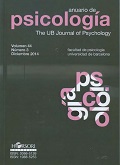The experience of identity transformation process for people living with tetraplegia and paraplegia
Article Sidebar

Main Article Content
Mariona Gifre
Arantza del Valle
Àngel Gil
Pilar Monreal i Bosch
A spinal cord injury (SCI) is perceived as a source of biographical disruption, not only at a physical level but also in terms of people’s life stories, their motivation and their self-esteem. The aim of this study is to explore the factors that people with spinal cord injuries perceive as contributing to rebuilding their sense of self. Two focus groups were established from the SCI community, one of which was made up of 14 people with paraplegia and the other of 9 people with tetraplegia. In addition, four individual interviews were conducted with the participants. The results of content analysis show that the two most prominent factors in the process of identity renegotiation are the partial transformation of the subject’s identity followed by a coming to terms with that new identity. To rebuild self-worth, the importance of finding a balance between change and continuity was identified. Renegotiation of identity after a spinal cord injury is a complex phenomenon that greatly influences the SCI individual’s quality of life perceptions. Reaching a balance between the changes experienced due to the injury and finding a sense of continuity can be either facilitated or obstructed by the economic, political, legal, architectural,and social context.
Keywords
Spinal cord injury, qualitative research, identity, self-worth
Article Details
How to Cite
Gifre, Mariona et al. “The experience of identity transformation process for people living with tetraplegia and paraplegia”. Anuario de psicología / The UB Journal of psychology, vol.VOL 44, no. 3, pp. 361-72, https://raco.cat/index.php/AnuarioPsicologia/article/view/285848.
Rights
Copyright
Authors transfer to the publisher all copyright for the full term of protection and for all the world.
The authors can post a copy of their articles in accordance with the policy of free access to the journal.